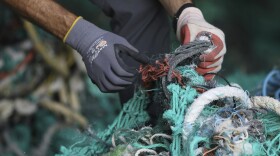The first local survey focused on sexual harassment in the workplace found that lifelong Hawaii residents were half as likely to report harassment compared to those who moved to the state in the last 10 years.
Safe Spaces & Workplaces, an initiative aimed at ending sexual harassment, commissioned the survey of 607 adults working in Hawaii.
Rachael Wong, one of the initiative's founders, said Hawaii may have a culture of silence that makes lifelong residents less likely to report harassment.
“It’s just our local culture. We don’t say things. We don’t bring shame to the family. We don’t make waves,” she said. “What we’re all working on is how do we create this common language so that if something happens that we can all say, ‘Oh, that person is uncomfortable.’”
Wong filed her own sexual harassment claim with the Hawaii State Ethics Commission in 2017, charging former state House Speaker Joseph Souki harassed her while she was the director of the state Department of Human Services. The complaint led to Souki’s resignation in March 2018 and a $5,000 fine.
“After learning about my situation, many reached out to me to let me know they also experienced sexual harassment in the workplace. But many remained silent for fear of retaliation or because they felt no one would believe them,” Wong said.
“We want to create a safe space to share our stories and develop solutions to make Hawaii a better place to live and work.”
Wong said the national #MeToo movement did not sweep across Hawaii as it did on the Mainland.
Thirty-three percent of those surveyed said they had most recently been harassed in 2018, the year after #MeToo gained national attention.
Beth Whitehead, the executive vice president at American Savings Bank, one of the 23 local companies that are part of the initiative, noted that #MeToo did spark a conversation within workplaces.
“We talk a lot about the ‘Aloha hug,’ and do you need to ask permission and make sure that’s okay? That’s probably a great way to be respectful,” she said. “You don’t want to change the things that are special about your work environment but you want to make sure everyone feels comfortable.”
The survey indicated sexual harassment is widespread, with 52% of women and 42% of men saying they experienced harassment. While the percentage of affected men was lower, the survey showed they were statistically more likely than women to report the behavior to an external oversight board.
Victims tended to be younger; the survey showed that those age 25 through 34 reported the most workplace harassment.
Among ethnic groups, Koreans had the highest rate of reported harassment at about 64 percent followed by "other ethnicity" at 58 percent and Hawaiian/Part-Hawaiian/Pacific Islander at about 55 percent.
The survey carries a margin of error of plus or minus 3.98 percentage points for any results reported for the entire sample.
The Safe Spaces and Workplaces initiative plans on hosting “talk-story” sessions across the state with employees and employers about addressing workplace sexual harassment. More information on the initiative is available on its website, safespacesandworkplaces.com.




